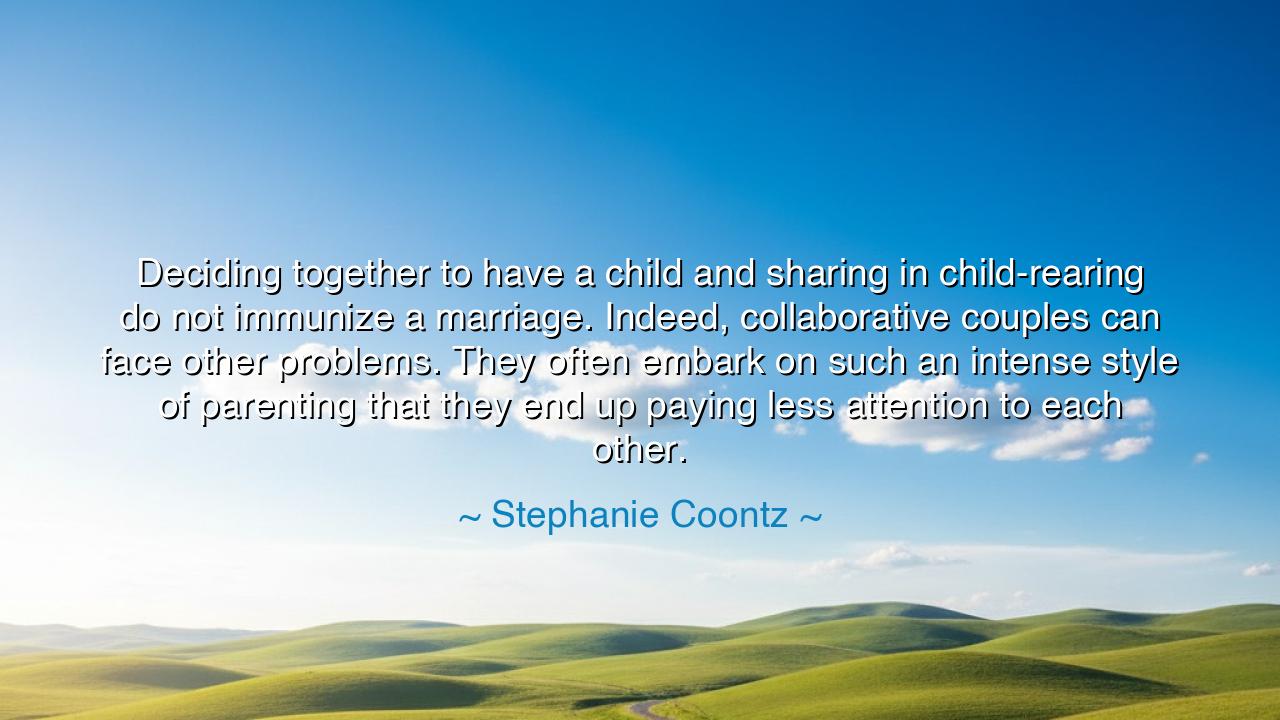
Deciding together to have a child and sharing in child-rearing
Deciding together to have a child and sharing in child-rearing do not immunize a marriage. Indeed, collaborative couples can face other problems. They often embark on such an intense style of parenting that they end up paying less attention to each other.






Hearken, O children of generations yet to be, and attend to the wisdom of Stephanie Coontz, whose voice pierces the illusions of easy assumptions in the life of families: “Deciding together to have a child and sharing in child-rearing do not immunize a marriage. Indeed, collaborative couples can face other problems. They often embark on such an intense style of parenting that they end up paying less attention to each other.” In these words lies a profound truth: that even the noblest intentions, even shared devotion to offspring, cannot alone preserve the bonds of union. Love and partnership must be nourished alongside the care of children.
The origin of this reflection rests in Coontz’s study of family structures, marriage, and the dynamics of parenting. Observing countless households across history and cultures, she discerned that while collaboration in raising children is virtuous, it carries the peril of neglecting the marital bond itself. Couples may invest boundless energy into child-rearing, yet inadvertently allow the intimacy, communication, and companionship that sustain their union to wane. Her insight is a reminder that families flourish not merely through shared responsibility, but through balanced attention to all sacred relationships within the home.
The meaning of her words is both practical and moral. Coontz cautions that parenting, though central to family life, is not the sole axis upon which a marriage turns. To devote oneself entirely to children, even collaboratively, without nurturing the marital bond, is to risk alienation, resentment, and erosion of partnership. The virtue of collaboration must be tempered with attentiveness, dialogue, and care for the couple’s relationship, recognizing that the foundation of a strong family lies in the strength of the union itself.
Consider the historical example of Queen Victoria and Prince Albert, whose partnership was often idealized. Together they raised nine children with great care and collaboration, yet both understood that sustaining their bond required deliberate attention, shared confidences, and private moments beyond parental duties. They recognized that nurturing the marital relationship was inseparable from raising children, and that love and partnership must coexist with responsibility. Coontz’s words echo this ancient wisdom: the marriage itself must be tended with diligence, not eclipsed by other duties.
Coontz’s reflection also carries a subtle warning: collaboration and intensity in parenting, though admirable, may lead to imbalance and neglect. Couples must be vigilant to avoid becoming consumed entirely by the demands of the young. The heart of partnership, once neglected, may weaken, leaving both spouses vulnerable to frustration, isolation, or misunderstanding. Wisdom lies in integrating care for children with intentional nurturing of the marital bond, so that both flourish.
The lesson for future generations is radiant: to build a household of lasting strength, one must balance devotion to children with devotion to each other. Love, partnership, and communication between spouses are not secondary to parenting; they are the wellspring from which the capacity to nurture children flows. A marriage attended with care strengthens the entire family, creating stability, respect, and emotional richness that guides the young through life.
In practical life, one may follow Coontz’s counsel by cultivating rituals of connection, shared reflection, and deliberate attention to partnership. Schedule time together, speak with honesty, and nurture companionship and affection even amidst the duties of parenthood. Observe the delicate balance between caring for children and sustaining intimacy, recognizing that the flourishing of one relationship enriches all others within the household.
Thus, O children of future ages, carry this teaching as both lantern and compass: parenting, even in collaboration, cannot sustain the marriage alone. Tend to love, partnership, and dialogue, and allow these bonds to nourish your children as well. In this careful tending lies the enduring strength of the household, the resilience of family, and the sacred legacy of devotion, attentiveness, and balanced care that will echo across generations.






AAdministratorAdministrator
Welcome, honored guests. Please leave a comment, we will respond soon